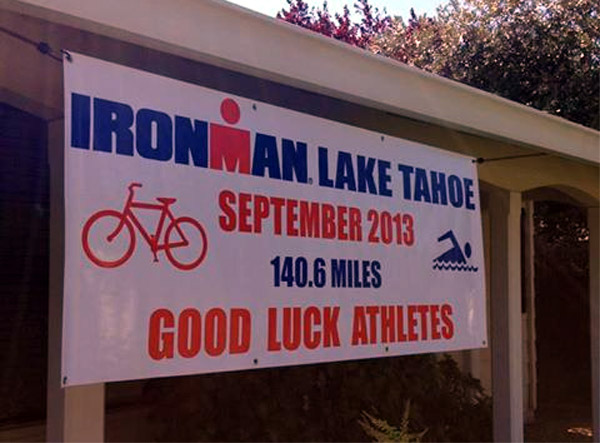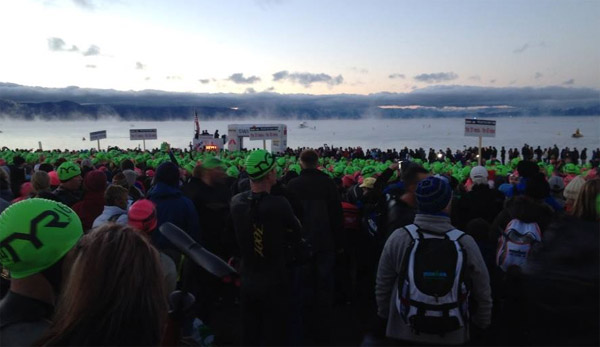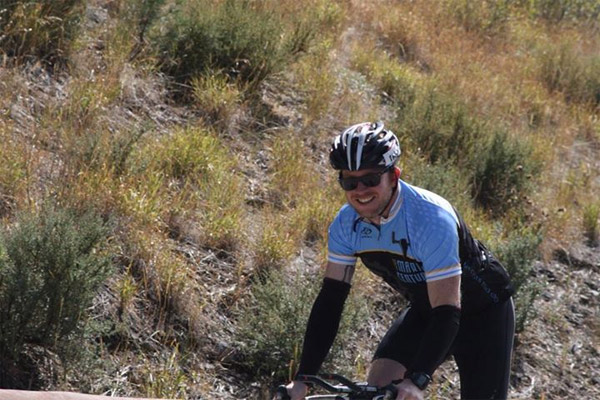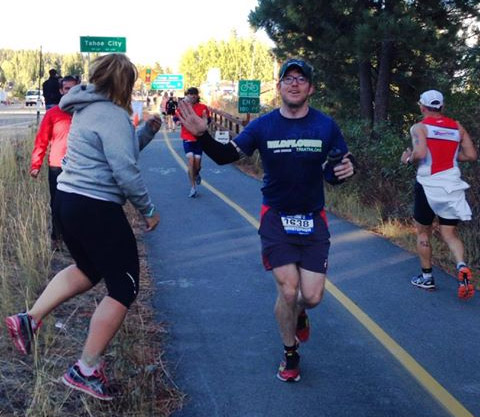Ironman Triathlon Interview
My friend Chris Loental ran in the Ironman Triathlon in Lake Tahoe, California. Chris was just a regular guy when he lived in Sacramento, so I was pretty impressed when I realized what sort of insane physical challenge he had attempted. I had a bunch of questions.

Rob Cockerham: Hey Chris! I can't believe you did it. That shit is crazy. Did you run it alone?
Chris Loental: I did the race "alone", but I definitely did not train alone. I had a group of friends who I trained with on the weekends, most of whom were also training for IM Tahoe. I also had a personal coach (retired badass professional IronMan triathlete, Tyler Stewart) who taught my weeknight indoor cycling classes and hosted some training camps up in Tahoe. She also provided me with my training plan.
Rob: What is your day job?
Chris: I am an electrical engineer. I worked for 12 years doing chip design for Intel, and now I do consumer electronics design for a super-secret startup.
Rob: Did you have to give up a regular life to train for an Ironman?
Chris: Yes and no. My training schedule usually called for workouts 6 days a week, sometimes having double workout days. A "typical" week would look something like:
Monday - Rest Day
Tuesday - 90 min indoor cycle class followed by 45 min run
Wednesday - 60-90 pool swim or masters class
Thursday - 90 min indoor cycle class followed by 45 min run or core workout
Friday - Short run and/or swim.
Saturday - 60 mile bike ride
Sunday - Open water swim + 15 mile run
Something like that. The volume changes up and down over the course of multiple months of training. Even though my IM training plan started in late May (race was in late Sept) I had been "base-building" since January.
In addition to the regular weekly training, I signed up for multiple "training races" and organized rides. Since January:
SF Kaiser Half Marathon
Rodeo Beach 50K UltraMarathon (Trail)
Wildflower 70.3 Triathlon (a "70.3" is a Half-Ironman distance event, but not IronMan branded)
SF Full Marathon
Pacific Crest 70.3 Triathlon
Tahoe "Death Ride" (130 mile bike over 5 mountain passes)
Donner Lake 70.3 Triathlon
Marin Century (100 mile bike)
Living in San Francisco, I was lucky to have the race course in my "backyard". I was able to do about 6 weekends training or racing at altitude in Tahoe, as well as practicing on the actual course.
So yeah, all of this can put a bit of a dent in your regular life. Right when my training volume started picking up early this summer, I started a new job and started dating someone new. I had to explain early on that if we were going to continue dating, that my weekends days were all spoken for until late September. Also that if she had an issue with spandex or moisture-wicking material, she'd better bow out early. Luckily, she's still hanging out with me and we've planned fun stuff for just about everyday in October.
You get out what you put into it. Often, I would have a work conflict and would have to miss a weeknight swim class. Or, there would be some social event which felt more important than working out. I think in total, I maybe missed two of my long weekend workouts, and a handful of weeknight ones.
I definitely saw less of my friends over the last 5 months, but I did get to see a few of my friends in spandex for 100's of hours. Balance!
Rob: If I remember correctly, you started running about eight years ago. How long have you been racing in athletic events? When did you start bike training?
Chris: Hrrm. Eight years ago. Not really. Eight years ago I was playing in bands and still smoking cigarettes. I had been a sometimes weekend-warrior cyclist in my early twenties, but never serious about anything, just fun casual riding. In my late twenties (i'm current 34), I moved to SF, and decided to try to start to take control of my health. This involved cutting down on bars and smoking, etc. and starting to go to a gym regularly. I started rock-climbing, and running on the treadmill/stairmaster,etc. but found both to be pretty boring. It was my first yoga class that actually got me hooked on fitness. I got super into yoga for a few years, and would still run on the treadmill here and there.
I think I was maybe 29 or 30 when my younger brother started posting all this crap about running marathons and doing triathlons. I had never had any exposure to endurance racing, so I started to learn about it from him. One Christmas, he challenged me to run a half-marathon, so I signed up for the SF Half Marathon, ditched the treadmill and started running outside and ran my first race in Summer of 2010. A few weeks before this race, I watched my brother do his first Ironman (IM Coeur d'alene). I saw all the praise my parents were giving him and it became apparent that I also had to start doing triathlons if I were to retain my status of favorite son. So, a week before this first running race, I signed up for my first triathlon, an olypmic distance race in Marin later that fall. This meant dusting off my old road bike and starting to ride again. So i'd say that summer is when I really started bike "training" even though I'd been riding for a decade. This is also when I started to learn how to swim athletically. I'd had a pool growing up and was scuba certified, but I had never actually swam "laps" on purpose. It was a rude wakeup call, but over the years I've transformed myself into a solidly mediocre swimmer! ;)
Rob: Have you ever not finished a race?
Chris: Luckily, I have never had a DNF (Did Not Finish). It will happen one day. It happens to everyone, I imagine. Injuries, crashes, mechanical issues, blow-ups, cosmic-rays, bear-attacks (http://ftw.usatoday.com/2013/08/bear-interrupts-ironman-triathlon/). Something will get you eventually.
I have had one DNS (Did Not Start) due to signing up for a race and then breaking my foot a week later! The wouldn't give me a refund or allow me to transfer my bib, so I was technically still a registered athlete. I just didn't show up.

Rob: Have you had many serious injuries in your race career?
Chris: Again, I'm lucky to have had very few. I had some on and off IT-band issues during my first year of racing. Also, the above-mentioned broken foot which had absolutely nothing to do with falling off of a homemade treadmill-desk while working from home. So don't even bother asking. This summer I was plagued by heel pain due to a tight-calf muscle. Changing my running shoes and getting some acupuncture and massage fixed me right up!
Rob: What other triathlons have you finished?
Chris: In chronological order:
Marin County Olympic - 2010
Wildflower 70.3 - 2011
Wildflower 70.3 - 2012
South Maui Olympic - 2012
Big Kahuna 70.3 - 2012
Wildflower 70.3 - 2013
Pacific Crest 70.3 - 2013
Donner Lake 70.3 - 2013
Ironman Lake Tahoe! - 2013
I've also done a bunch of road half/full marathons and trail-running races.
FYI an "Olympic" distance is:
Swim: 0.9 mile
Bike: 25 mile
Run: 6.2 mile
70.3 or "Half-Ironman" distance is:
Swim: 1.2 mile
Bike: 56 mile
Run: 13.1 mile (half-marathon)
140.6 or "Ironman" distance is:
Swim: 2.4 mile
Bike: 112 mile
Run: 26.2 mile (full marathon)
A "Sprint" distance triathlon is usually about half the distance of an "Olympic" but the exact distances for each sport are not set in stone.
Rob: I know people who bike and run, but I don't know anyone who swims. What was your swimming history and training like?
Chris: For my first triathlon, I signed up with Team In Training (TNT), an endurance-sport fundraising arm of the Leukemia and Lymphoma Society. In return for raising money for cancer treatment and research, I was provided with some coaching and a team of folks to train with. As stated above, I was a pretty awful swimmer when I started, but I had good base fitness. I got some real basic form tips from my TNT coaches and also read a book called "Total Immersion" which teaches a relaxed and efficient swim technique. Lots of pool practice and the occasional open-water swim. Doing an Open-water swim in San Francisco means squeezing into your wetsuit and going for a dip in the Pacific, usually at Aquatic Park (in between Fisherman's Wharf and Ft. Mason). It's fun, but its also pretty gross, cold and can be terrifying if you've got a fear of underwater creatures, as you can see absolutely nothing underwater. ;)
I always tell myself that I'm going to start going to masters classes more often, or get some proper swim coaching, but I have yet to. Now that this race is over, I think I may take my swim training a little more seriously. It's hard to want to spend a bunch of time swim training, because its the shortest part of the race, time-wise and thus has the least return on investment. That's why so many triathletes are mediocre at swimming compared to their cycle and run abilities.
Rob: What was the "taper" you were posting about before the race, and why did that give you blues?
Chris: Before any large race, you reduce the volume of your workouts. This is called "tapering". I am not a fitness expert, but the basic purpose is to rest your muscles (stop breaking them down) and store up lots of glycogen (fuel) for your race. Your engine doesn't get the benefit of your longest and hardest workouts until you ease off and let it rest for a bit. For shorter races, like a half-marathon, you might taper for a week or so. For my Ironman, I tapered for 3 weeks.
The "taper blues" are feelings of restlessness. These are both physical and mental. Physically, you've spend the last 5+ months constantly working out, and all of a sudden you're doing a 20 min jog instead of a 20 mile run. You have extra energy to burn, but nowhere to put it. Mentally, you've been sticking to the schedule, putting in the hard work and getting the endorphin reward from all the hard sessions. Now you've got the anxiety of the approaching race and all you have is time to think about it, and nothing to distract you and nothing to do to make you feel like you are moving towards your goal. You are itching to workout. For my taper, I was extremely lethargic, a little depressed, felt like I was about to get sick and had random aches and pains I hadn't had all season. Google "taper blues". It's a real thing.
Rob: Some people avoid sports with fancy equipment requirements. Do you have a sense of your total equipment outlay for this race?
Chris: I'm not too much of a gear junkie. You can spend A TON of money on triathlon, especially with the bike. There are people out there with custom carbon race wheels where ONE wheel costs more than my entire bike. Then there are people who probably spent less than half of what I did for my gear. I'll give a quick estimate of my primary gear, assuming I had to buy it all for this race:
Bike: $3500
Swim: $300
Run: $100
Workout clothing: $400
A lot of my gear is accumulated over the years. If you take care of them, you only need one pair of cycle shoes, ever. Assuming no crashes, a helmet gets replaced every few years. Wetsuits last for a few years. A good bike will last you forever, with regular maintenance. Some gear needs to be continually replaced; swim goggles, new cycle shorts, running shoes every 300 miles, tubes of "Body Glide", etc.
Aside from gear you've got your gym/spin/pool memberships, race entries (IM Tahoe was $675, other shorter races are MUCH cheaper), bike tune-ups, coaching, etc.
FYI, for my first triathlon, I rode on an entry-level road bike which cost $400, which I had purchased almost 10 years prior. You dont NEED pro-gear to do a triathlon.
Rob: How was the swim?
Chris: The swim was awesome! Waiting for the swim was HORRIBLE. It was 630am and the air temp was in the low-30s. Everyone was crowded around in wetsuits on a cold and wet beach itching to get into the water, which was a balmy 60-something degrees. I had popsicle feet. The elites started at about 6:40am and then the rest of the athletes ("age-groupers", who's results are ranked by age/gender group i.e. Men 35-39) started streaming into the water. Most Ironman races have a mass-start where everyone just plows into the water at the same time. For IM Tahoe, they did a "self-seeded" start, where you kinda lined up according to your estimated swim-time and then people started running single-file-ish in to the water, your official start-time not recorded until you crossed over a timing-mat. (All times are recorded via a RFID house-arrest anklet)
A cool side-effect of the air/water temp differential was that there was tons of steam rising off of the water. It looked like you were swimming straight into Mordor. This also meant that it was really hard to sight the buoys., You would go around a buoy then have to pop your head up and scan through the mist to located the next buoy.
Because the swim was in beautiful Lake Tahoe, the water was crystal clear. Turning side-to-side underwater you could see all your fellow competitors plowing through the water. It was a really surreal and beautiful swim for me.
Rob: How was the transition from swim to bike?
Chris: This was the worst part of the race for me. In Non-Ironman triathlons, you usually set up all your transition gear right under where you rack your bike. This means running out of the water and straight to your bike, stripping your wetsuit and throwing on your bike clothes and heading out. For IronMan tris, you run out of the water and find your "transition bag" which is full of your bike gear, then run into a gender-separated changing tent, where you can get fully disrobed, then change into your gear, then go find your bike. This is all well and good, but for this event the T1 (transition #1) change tent was TINY. I ran out of the water (to thunderous applause, all for me I assume) and over to the wetsuit strippers, who have you lay on the ground as they yank off your wetsuit. Oh my, theres that 30-degree air-temp! Then into the changing tent, which was so FULL of people that I had to wait for about 5 minutes to even find a spot to change. They had heaters going in the tent but I felt like a popsicle and it took me forever to get my gear on.

Rob: Did you see anyone fall out?
Chris: Not directly, but I saw a lot of people who were not going to make it. I saw few crashes on the bike, one serious enough that the person would not be able to continue. I saw someone on a borrowed cellphone calling their spouse, probably to drop. As I was about to finish my race, I saw people out on the first loop of the run who were walking and may have not made the finish.
Rob: How long did you spend standing still?
Chris: As stated above, about 5 minutes waiting to change. I stopped at a few aid stations on the bike for bathroom breaks, to refill bottles. On the run, I would speed-walk each aid-station (there was one every-mile) as I grabbed at cups of water, coke, potato-chips, and chicken broth. Not much standing still, you gotta just keep moving!
Rob: The Ironman biking segment is 112 miles, taken from a bike race in Hawaii which used to be split over two days! I mean, 112 miles takes two hours to drive in a car!
Chris: The bike for this race was REALLY challenging, with about 7000ft of total elevation gain. My ride time was over seven and half hours! I've ridden much flatter courses, much faster. Due to the bike course and the race being at elevation, IM Tahoe is now the "slowest" Ironman on record, which an average finish time of around 14 hours. My finish time was a few mins over the average, not too bad for my first one! I think I could've done around 12 hours with a flatter course.For comparison, the professional who won did the bike in under 5 hours and the total race in under 9!
Rob: From the map I saw, the biking segment was strikingly complicated. Were you worried about getting off track?
Chris: Nope. At every turn, there were multiple race volunteers pointing the way. Speaking of, the volunteers for this race were amazingly supportive and encouraging.
Rob: Are you pretty much silent the whole time, or do you chat with your fellow insane athlete brothers?
Chris: I struck up random conversations on the bike. Cycling up a huge mountain is a lot easier if you have something to take your mind off of things. Lots of "so, where are you from?" "Is this your first Ironman?" "How about that swim?", etc. On the run it's easier to have longer conversations, but by the time I got the run, I didn't feel like talking very much! ;)
Rob: Do you feel like the events are in the proper order? Swim, Bike, Run?
Chris: Yes. If it were the other way around it would be: Run, Bike, Drown.
Rob: What was the first point you thought you were going to die?
Chris: Haha. I was pretty nervous all morning, until I got to the beach. Try waiting around with 2500 other nervous endurance junkies who haven't been allowed to workout for 3 weeks. There's a lot of energy in the air.
There were a few points on the bike when I checked in on my time and got a little discouraged that I was going slower than I had anticipated. But I just remembered that it was my first Ironman ever and it's not like I was gonna win anything by going faster and I should just enjoy it! You go in and out of dark points all through these races, the trick is to realize you're being negative and get your shit together mentally. Also, you should probably eat something.
The last 8 miles of the run were hard. At that point in time, I didn't have any doubt that I would finish, heck I could've walked the rest of the marathon and still made the cutoff with lots of time remaining. But - who wants to walk?!? Well, I wanted to walk but pushed myself to try to keep a reasonable pace, which eventually degenerated into a reasonable shuffle.
But yeah, never really thought I was going to DIE. The look on my face may have said otherwise.
Rob: How much of the race time was spent fiddling around with an electronic device? I just realized that 14 hours could be too much to ask of an electronic device!
Chris: I've got a Garmin GPS running watch with a battery life of 8 hours, so it was a no-go for this race. I borrowed a newer watch with a 20 hour battery life. I used it, but didnt really use any of the data (total time, pace, etc) as feedback for my performance. It was my first Ironman, and all I wanted to do was to take care of my body, push close to my limit and finish. For other races, where I have specific time goals, I'll use the data to pace myself.
Rob: Did you drink your recommended 8 glasses of water that day?
Chris: Haha. On the bike I drank around two 24 oz bottles of fluid per hour.
Let’s do some math:
2 bottles x 24 oz x 7.5 hours = 360 oz / 8 oz of water per glass = 45 glasses of water
For the run I would just grab at paper cups of whatever they were handing me (chicken broth, coke, water) take a sip or two then throw away.
Rob: Do you use any ridiculous products on a race like this, like glucose pods or anything?
Chris: I use:
"Skratch Labs Excercise Hydration Mix", raspberry flavor for my electrolytes beverage.
"Salt Stick" electrolyte pills.
"Shot Blox", Margarita flavor. Easy to digest calories!
"Bonk Breakers" Peanut Butter/Jelly Sandwich sports bars.
I also ate a ton of bananas and potato chips.
Rob: Which specific performance-enhancing drugs have you been taking?
Chris: Just the One True Ring.
Rob: Did you take note of your weight loss during the race?
Chris: Nope. I actually started gaining weight when I started doing triathlons. I'm about 15lbs up on where I was 3 years ago!
Rob: Is the Ironman crowd different than in other events? Any memorable signs or crowd moments?
Chris: Yes. Most of the crowd is there to support friends or families, and a large percent of these spectators are also endurance athletes. They know why you're out there and they know what it feels like. There is a lot of solidarity among triathletes and spectators.
Rob: Were you the only athlete smoking cigarettes during the race?
Chris: I've got a hookah built into my bike.
Rob: Did you complete the race in the 17-hour official completion window?
Chris: Yep, did it in a little over 14 hours!
Rob: What was it like crossing the finish line?
Chris: Wow. I had my family, girlfriend and a bunch of amazing friends up in the bleachers screaming for me when I came through the chute. Once you realize you're on the last push, all the aches and pains go away. I got across the line and was immediately grabbed by a race volunteer who held onto me and walked me through the finisher area. A certain percent of Ironman athletes would fall flat on their face seconds after crossing the finish line, and I guess I looked like one of those guys. I felt ok, but was definitely wobbly. Once you cross that line you brain realizes it’s all over and then relinquishes control over your body, which for the past 14 hours has been screaming AW HELL NO.
It was an amazing feeling. :) I think my official time was 14:13!
Rob: Do I have to call you Iron Man now?
Chris: Call me Chris "Danger is my Middle Name" Loental
Rob: How long will you be recovering in a wheelchair?
Chris: The race was Sunday, it's now Thursday and I feel great! The day after, I was really really sore. Every time I sat down, it was a chore to get back up. I'm still a little sore and tired but no worse than I was while training for this thing. I'm going for a massage soon!
Rob: This is the most difficult physical endurance test I know of. Being an Ironman triathlete you probably know some other, even more extreme ones. What are they?
Chris: My younger brother will run a 100-mile trail race in November. The cutoff time for that is 32 hours! Here's a "Triple Deca Ironman", which is one full ironman, every day, for thirty days: http://www.decaironman.com/
There are a lot of stupid people out there, Rob. I'm glad to join their ranks. ;)

Rob: Great job Chris! Seriously, that was crazy.
Chris: Thanks, Rob! If any of you Cockeyed readers out there are interested in doing a triathlon and have more questions, feel free to contact me!
Cockeyed home page | Contact | Terms and Conditions | Updated October 3, 2013 Copyright 2013 Cockeyed.com



